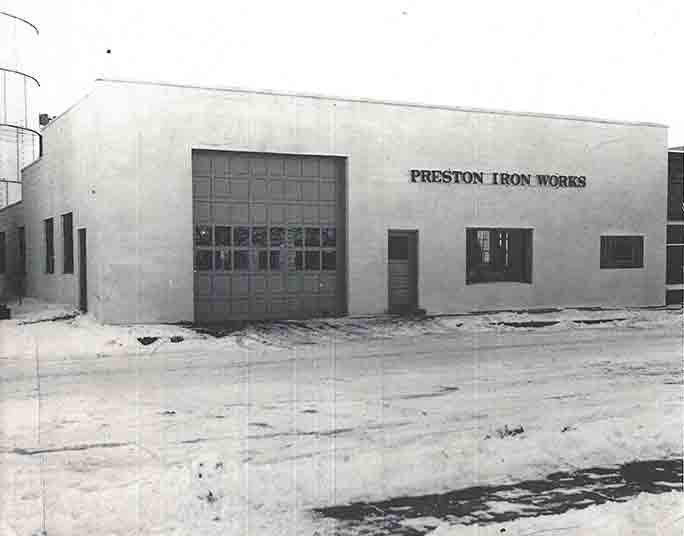
By Joanne Hall
Member of the Preston
Historical Society

Photo courtesy of Preston Historical Society
In 1853 John Vail from Pennsylvania was the first man to locate a claim in what became the village of Preston. That same year William Douglass started the first blacksmith shop in Preston. In July of 1855, a blacksmith shop was operated by Charles Rappe, who bought out the forge and business of William Douglas. The site of the forge was located on Mill Street.
By the 1880s, a man by the name of Cramer was the owner of the business known as the Wagon Works. At that time Mr. Homer S. Popple from New York, a carriage maker, worked for Cramer. In 1890, Homer Popple and George Renner purchased the Fred Dawson foundry and machine shop “on the flat” in Preston. In 1898 Elmer H. Cummings, Popple’s son-in-law, became an apprentice to Homer Popple.
George Renner retired in 1901 and the business name became Popple and Cummings, later known as Preston Iron Works. They had two assistants and were equipped with lathes, saws, drills, and planers. They were well known in this part of the state to be equipped to do difficult repairs. They patented and manufactured the water-cooled Preston Gasoline Engine beginning in 1910. Their name was cast on this engine which was built in its entirety in Preston along with the Preston Jack. The jack fit any pump and it had three strokes.
Tony Olsen, of Brookings, S. Dak., purchased the business in 1937 and upon Olsen retiring, Vern Runningen purchased the business. To keep the Preston Iron Works going, he kept the same employees who ran the business – Don Trende, Gerald Wubbles, and Roger Hovey.
DeWayne and Norma Vogt purchased the Preston Iron Works in December 1972. DeWayne added on to the building in the late ‘70s and eventually sold the building to the surrounding elevator company in 1984. Vogt then moved the business to a location on Hwy 52. Under DeWayne’s ownership they specialized in custom fabrication, ran a complete machine shop, welding service and a full line of parts.
Vogt semi-retired in 2003 and sold the business to Sheldon Kinneberg. The business closed in 2017. In 2021, Norma and DeWayne Vogt donated many original items from the Preston Iron Works to the Preston Historical Society, a selection of these tools and artifacts are now on display at the Fillmore County Historical Society Museum.
Formed in 2020, the Fillmore County History Partners is a voluntary collaborative of local history organizations and museums. Participants include: Canton Historical Society, Chatfield Historical Society, Fillmore County Historical Society, Harmony Area Historical Society, Historic Forestville, Lanesboro Historic Preservation Association, Lenora Pioneer Church, Mabel Historic Preservation, 1877 Peterson Station Museum, Preston Historical Society, Rushford Area Historical Society, Whalan Town Hall Museum, Wykoff Area Historical Society.


Leave a Reply